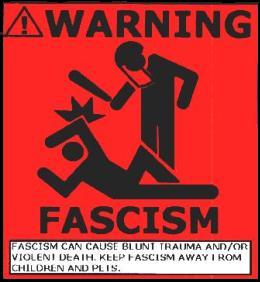Dropping the F-Bomb, Part II
The Uses of "Islamo-Fascism"
“Yes, [fascism will come to America], but we will call it ‘anti-fascism’.”
- Huey Long
 There are several incarnations of the above quote floating around the internet. Another version goes "If fascism ever comes to
There are several incarnations of the above quote floating around the internet. Another version goes "If fascism ever comes to This brings me, somewhat belatedly, to my earlier discussion of the strange use of the word fascism by the Bush administration. The term they've decided to throw around, "Islamo-fascism", has almost no meaning at all on its own merits. As we have seen, even taken within the context in which they use it, it fails the sniff test miserably.
So why would they use it? Before going into the details, let's first go back a bit to clarify some of the basics.
Fascism, as it is commonly understood and defined, is a secular phenomenon more closely associated with corporatism than religion. The term was coined by the Italian philosopher, Giovanni Gentile, ghost-writing "The Doctrine of Fascism" to describe the government and philosophy of Benito Mussolini. In a passage famously misattributed to Mussolini himself Gentile wrote:
"Fascism should more properly be called corporatism because it is the merger of state and corporate power".
It's pretty clear that of all the flaws we can associate with radical Islam the desire to merge state and corporate power is not one of them. The thing many radical Muslims do want to merge with government power is religion, namely Islam, not business. This is what happened in the Iranian Islamic revolution in 1979. As a result that country is now ruled by a Supreme Council comprised of powerful Shiite clerics.
Now, it can be argued that this coupling of Islam and government is why "fascism" is has been modified with the prefix "Islamo" in this new-fangled terminology. No doubt, that was clearly the thinking behind it. But the problem is that there already exists a word for this kind of governance. That word is "theocracy", a term that is never, ever associated with any known fascist regimes. Does anyone ever confuse Nazi Germany, Mussolini's
Words still have meaning and the word fascism refers to a specific style of governance characterized by secular, militaristic, nationalistic, xenophobic, authoritarian and often racist rhetoric, ideology and policies. Radical Islam, to the contrary, refers to a set of beliefs that are religious rather than secular; pan-Arab and pan-Muslim rather than nationalistic; multi-racial rather than racist; and multi-ethnic rather than xenophobic. The distinction is stark even if we limit our analysis to Islamic militants. It becomes even sharper if you mix in the inclusiveness of more moderate and orthodox Islamic views.
So the invented word, "Islamo-fascism", is really nothing more than a blatant contradiction in terms. The number of "Islamo-fascists" in the world is exactly equal to the number of Catholic Atheists you'll find. It's an absurdity, utter foolishness with no real meaning whatsoever.
So, again, why do they use it? Here's a hint. It's not that they're stupid. This terminology serves a few very important purposes for the Bush administration specifically, the American right more generally and many of their supporters.
The Preemptive F-bomb
First and foremost, the use of this terminology helps get the Bush Administration out in front of the issue of fascism itself. This is especially advantageous for them because as each day passes the analogy between the
So, to cover up this vulnerability they have chosen to engage in a little projection. In short, they are labeling someone else, anyone else, 'fascists' before the label can be affixed to their own foreheads. So it seems, Bush's doctrine of preemption extends to rhetoric as well. By the way, if anyone doubts the plausibility of projection as a motivation, look no further than the case of Rep. Mark Foley (R-Fl) who, prior to his recent outing, was one of the most outspoken crusaders against sexual predators targeting underaged youngsters on the internet.
This projection is enabled by a media establishment that, up to this point, has faithfully shunted aside any attempt to study the authroritarian or fascistic aspects of our current government, its policies or its rhetoric. Quite to the contrary it has proven itself quite eager to promote and amplify the government's pre-packaged messages with respect to each of these. Any discussion to the contrary has been shouted down and deemed far too "shrill" or "extreme" for "serious" people to discuss. As a result, Bush's supporters have been free to scoff at the analogy for years without fear of rebuke or challenge despite the obvious corollaries. It is as if an invisible seal has been placed over the entire concept preventing even a cursory examination of it in the mainstream.
Into this void steps the Bush administration with its squadron of flying monkeys in the right-wing media. Because of the strict embargo the media has placed on the use of the term -- and the appalling timidity of the liberal and Democratic party establishment -- the Bush gang has been allowed to preemptively assume the mantle of anti-fascism as their own and, in the process, divert attention away from their own dances with the fascist devil.
"We're not fascists! We're fighting fascists!" If only it were true.
WWII Motif
By framing their policies as part of some epic, existential battle against the scourge of global "Islamo-fascism" the Bush administration also hopes to create an alternative World War II analogy that casts them in a more favorable light. In their Orwellian version, the fascists are not corporatists here in the
Once the world has been so defined it takes only a small leap of logic to conclude that enemies of Bush are enemies of freedom. In this manichean framework you're either with us or against us and if you're against us, even if you are an American, you are the enemy and are eligible to be spirited away on a mystery tour of black sites and torture rooms. So, it's entirely reasonable that we now have laws in place to empower our high protector to do just that, you see.
Mission Creep
Throw the "Powell Doctrine" out of the window. It was never a part of the plan. Almost every facet of that set of principles presented by Colin Powell has been systematically ignored by the Bush administration. Check the scorecard. Powell's doctrine required that the following questions all be answered in the affirmative before military action should be taken. Let's see how Bush's actions in
- Is a vital national security interest threatened? As has been proven, no.
- Do we have a clear attainable objective? Clearly not.
- Have the risks and costs been fully and frankly analyzed? Nope.
- Have all other non-violent policy means been fully exhausted? Ha!
- Is there a plausible exit strategy to avoid endless entanglement? See #3.
- Have the consequences of our action been fully considered? See #3.
- Is the action supported by the American people? At the time, I must admit, sadly, yes. But, of course, that support was based on blatant lies. If they had been told the truth at the outset, I believe Americans would have responded differently.
- Do we have genuine broad international support? Negatory!
So, clearly the Powell Doctrine does not influence this administration. From the very beginning it seems as though Powell was intended to function as nothing more than a show pony fronting for the cabal that really made policy. That's unfortunate because the key to that doctrine, though only implied here in item #2, is the avoidance of "mission creep", the notorious failing of the Vietnam War that Powell knew all too well. With mission creep, the scope and objectives of military operations are constantly shifting and expanding. The need to avoid falling prey to this syndrome is widely seen as one of the enduring lessons of the
However, as strange as it may seem, for the Bush administration mission creep actually seems to be the goal. We were initially told that war was being thrust upon us by an Iraqi regime that threatened us and the world with "the most lethal weapons ever devised". They told us that we had to go to war there in order to seize and destroy these "weapons of mass destruction" before Saddam Hussein rained death upon us all.
Then, once were were already involved we were told that WMD were not the issue at all. Instead it was democracy for the Iraqis, which necessitated a prolonged occupation of that country. From there it morphed into the democratization of the entire middle-east.
Now, finally it is now a full-blown struggle of global proportions. We find ourselves now unwittingly cast in a multi-generational, global conflict against the scourge of "Islamo-fascism" which threatens to take us into
Soft on Theocracy
 As I've alluded to above, the radical Islamic ideologies that drive Islamic terrorism and oppressive Islamic governments are best described as theocratic. However, defining the enemy around that terminology is problematic for President Bush and his evangelical base of supporters. The Christian Right movement has an inherent vulnerability on the issue of theocracy.
As I've alluded to above, the radical Islamic ideologies that drive Islamic terrorism and oppressive Islamic governments are best described as theocratic. However, defining the enemy around that terminology is problematic for President Bush and his evangelical base of supporters. The Christian Right movement has an inherent vulnerability on the issue of theocracy.With their base of support eroding to a small group of hard-core "dead-enders", so to speak, neither the Bush administration nor the GOP can afford to alienate even the most radical factions of that group. If they were to frame their global war-making as an epic struggle against theocracy they risk not only a frontal counterattack from critics on the rank hypocrisy of it all , but it would be particularly awkward for those radical factions on the right who hold theocratic views themselves (the theocratic tendencies of this government and its supporters is well-documented and something that they've even celebrated publicly, but I'll deal with that later).
For this reason, raging against the broad threat of theocracy can't be the centerpiece of the Bush team's pitch. It cuts too close to home and raises too many uncomfortable questions. Another term was needed in it's place, one that shields their most-favored theocrats from any potential political blowback. The word they chose for this purpose is "Islamo-fascism". In addition to serving all the purposes outlined above, this phrasing takes theocracy off the table and specifically excludes Christianity from it's scope, thereby placating the radical reconstructionists, dominionists and Christian Zionists who animate a significant portion of the evangelical right.
Fortunately for us in the reality-based community, this framing of the issue doesn't have to rule the day. Playing the fascism card, dropping the F-bomb, is a double-edged sword. It breaks the seal on the discussion of fascism and its characteristics in mainstream discourse and allows us to venture into previously forbidden but fertile ground.
Coming soon: Dropping the F-Bomb, Part III: "The Seal Has Been Broken"
See also: Dropping the F-Bomb, Part I





2 comments:
Well-written and insightful, bringing in a wide range of issues and historical considerations.
I seeing this comment for the first time today. Thank you for your kind words.
Post a Comment